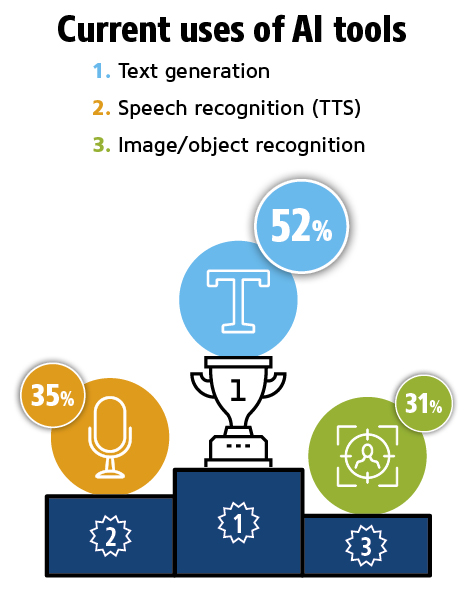Artificial intelligence (AI) is steadily growing in importance in industry and the world of business. This technology is set to fundamentally transform the way we work and conduct business. The newly released AI-ready Enterprise 2024 study from COMPUTERWOCHE Research Services, conducted in partnership with Lufthansa Industry Solutions (LHIND), determines the AI-readiness of individual sectors, highlights the areas in which AI has been deployed to date, identifies the driving forces behind AI development and discusses the role of security aspects.
AI-ready Enterprise 2024 study identifies companies’ AI priorities
While the initial euphoria may have faded slightly, artificial intelligence remains a very relevant topic for most companies and a high investment priority. The AI-ready Enterprise 2024 study found that around half of all companies already use AI-powered modules. This means that, in most sectors, artificial intelligence is no longer uncharted territory.
Larger enterprises ascribe higher importance to AI – as do respondents at higher positions in company hierarchies. But how can we assess companies’ AI-readiness levels in reality? There is clear room for improvement in this regard: many companies are still in the sensitization phase and are conducting initial pilot projects. All the same, a quarter of companies have already reached the scale-up phase, with larger enterprises again leading the way.
What is striking is that the initial hype has given way to a more focused approach. The new motto? “Quality, not quantity.” Companies are increasingly coming to rely on sophisticated and realistic AI applications rather than haphazard experimentation.
Discover the degree to which artificial intelligence has penetrated different business areas, the drivers behind the wave of AI adoption and what companies hope to achieve by deploying AI.
How secure is AI?
Security is an important consideration when it comes to the use of AI. The majority of respondents in the study would like to see dedicated safeguards for AI systems, such as regular security updates and optimized data encryption. The need for security precautions becomes more pressing as companies grow larger. The fear that malicious actors could misuse confidential or sensitive data is particularly pronounced in large organizations.
However, the necessary safeguards should already be part of standard IT security operations – and whether additional measures developed specifically for AI would actually add value remains questionable.
- Which business areas are leading the way in the use of AI?
- Which AI tools are most popular?
- What budgets have been set aside for AI in 2025?
- What specialist support do companies use to support the introduction of AI?
- What impact do companies hope to achieve by implementing AI?

- A focus on efficiency
Many companies have focused on generative AI, using it to produce text, images or videos. Other areas such as data analysis, process automation and procedural optimization are also popular areas of application – with the use of AI squarely focused on boosting speed and driving efficiency. - Higher productivity, happier employees
AI can deliver positive impacts in many different parts of a company. But what expectations do companies attach to their use of artificial intelligence? The answer is clear: higher efficiency, higher productivity and higher turnover. AI projects need to deliver a tangible return on investment (ROI). In addition to financial indicators, however, employee satisfaction is an important metric – especially for smaller enterprises, who also hope to reduce their costs. - Existing AI hotspots
As is to be expected, IT and cybersecurity topped the rankings in the use of AI. However, artificial intelligence has also made significant inroads into HR and employee training and development. In many cases, there is still a lack of expertise and coordinated processes, especially in smaller businesses. Yet, overall, we expect most companies to provide bigger budgets for implementation of AI solutions in the year ahead.

